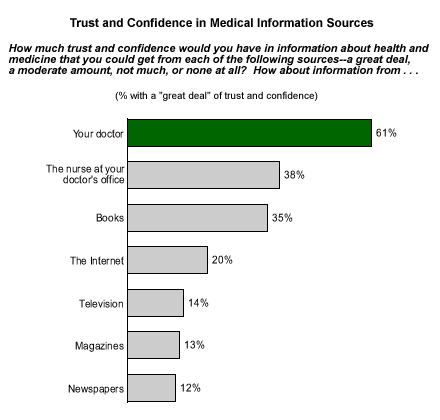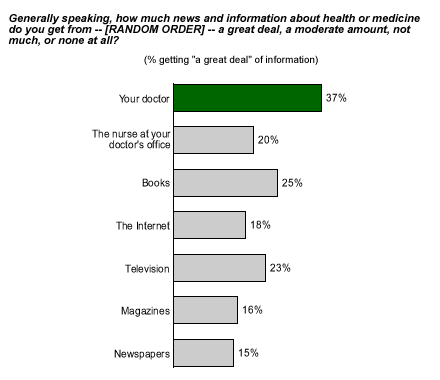This article is the first of two articles on Americans' perceptions of the medical profession.
The days of house calls and $5 doctor visits are long past in this country. As healthcare costs continue to skyrocket, many patients rely for their medical care on sprawling HMOs, many of which have some control over their patients' choice of doctor. Furthermore, in today's high-tech environment, patients can access health information from a wide range of sources other than their doctor. Despite these potential obstacles to close doctor/patient relationships, Gallup's data indicate that most people have a high degree of trust and confidence in their doctors and the medical information and advice they dispense.
Confidence
A Gallup Poll conducted in November 2002* shows that a majority of Americans (64%) say that when their doctor gives them important medical advice, they usually feel confident in the accuracy of that advice. Only 34% of people lack that confidence and feel that it is necessary to check for second opinions or do their own research on the topic.
When asked if they have more, less, or about the same amount of trust and confidence in their doctor than they did a year ago, more than twice as many respondents (25%) said that they have more (25%) versus less (11%) trust and confidence now. More than half (57%) say they have the same level of trust and confidence this year as last year.
Doctors Are Most Trusted Source of Information
When asked about their confidence in different sources of health information in a September 2002 Gallup Poll**, Americans rank doctors at the top of the list. More than three in five (61%) have a great deal of trust and confidence in the medical information they receive from their doctors, while all other sources engender much lower levels of confidence. Information from "the nurse at your doctor's office" ranks second on the list at 38%, followed closely by books (35%). Interestingly, more people say they are confident in medical information they get from the Internet (20%) than say they trust information from more traditional media sources such as newspapers (12%), magazines (13%) and television (14%).

Not only do people have more confidence in the medical information they receive from doctors as compared to other sources, they are also more likely to get a great deal of medical information from doctors. Thirty-seven percent of people say they get a great deal of "news and information about health or medicine" from their doctor, while only 25% of people get a great deal of medical information from books, the next most-relied-upon source. Just 18% of people say they get a great deal of health and medical information from the Internet.

Key Points
While the Internet and changes to the healthcare system have opened up new avenues for medical information, Americans still place a great deal of value in the opinions of their doctors. In 2002, most people are still far more likely to turn to their doctors for health-related information -- and have trust and confidence in that information -- than to other sources.
Next week's article will examine perceptions of honesty and ethics in the medical profession.
*Results are based on telephone interviews with 1,001 national adults, aged 18 and older, conducted Nov. 11-14, 2002. For results based on the total sample of national adults, one can say with 95% confidence that the maximum margin of sampling error is ±3%. For results based on the 526 national adults in the Form A half-sample and 475 national adults in the Form B half-sample, the maximum margins of sampling error are ±5%.
**Results are based on telephone interviews with 1,004 national adults, aged 18 and older, conducted Sept. 5-8, 2002. For results based on the total sample of national adults, one can say with 95% confidence that the maximum margin of sampling error is ±3%.